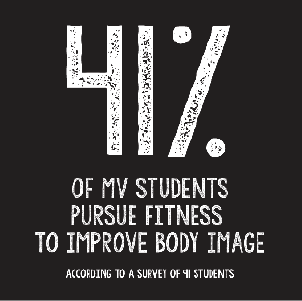As we welcome the new year, many of us are resolving to change our bodies, and personal health. According to the Journal of Clinical Psychology, two-thirds of American New Year’s Resolutions are fitness-related, but we often question where this motivation truly lies: for our health or for the mirror? Controversy has raged over whether the pursuit of body image is an acceptable incentive for improving personal health and there are convincing reasons for and against this fitness lifestyle. While it is a good motivator, fighting for the ideal appearance must be done carefully, without following potentially disastrous shortcuts or plummeting into dissatisfaction or despair.
As long as it keeps me fit
Although many dislike the idea of conforming to societal standards of beauty, it does play a significant role in our lives. If the desire to look like a 1990s Brad Pitt is what motivates us to go the gym or to eat correctly, is that such a bad thing?
With 2 in 3 Americans considered overweight or obese (National Institutes of Health) and 1 in 4 American deaths caused by heart disease (Centers for Disease Control), we should take every opportunity possible to catalyze health improvement, even if that means giving into a pressure that demands pursuit of the “perfect” body. While self-love is important to our mental well-being, we cannot deny the massive threat obesity and poor diet poses to everyday Americans.

But is that mentality working out?
What we often forget is that body image is just that: an image. The picture of a 00 waist with rock hard abs is an idealized version of a body everyone “must” have. We fail to realize that the only type of body we must have is a healthy one, and a picture perfect body does not mean that a person is healthy. According to Warwick fitness consultant, Nadia Ellis, although muscle building does burn fat, the true key to a healthy body is cardiovascular exercise and a healthy diet. People, however, take unhealthy, and sometimes drastic measures to lose or gain weight, including taking drugs to lose weight in a short period of time. Although this seems to be a convenient alternative to the physical exertion required to lose weight, these pills take away the health aspect of fitness. Senior Ameya Pandit set himself weight training and exercise goals for his body. He explains that a certain body image comes with a lot of commitment and hard work. Although he’s not opposed to people using dietary supplements to lose weight, he explains that it’s not the most surefire method.
“Eventually [people] are going to have to go the hard way of dieting and going to the gym, because otherwise you’re just going to be relying on pills and as soon as you’re off the pill, you’re going to go back to the original eating habits and exercising routines again” Pandit explains.
Pandit also uses exercise to relieve stress and maintain a healthy body physique.
“Your body feels great because you’ve accomplished something,” Pandit said.
According to Women’s Health magazine, exercise also helps strengthen joints and helps prevent heart disease as well.
But why have a healthy heart when you can look like a Victoria’s Secret model in just a few days? According to the Food and Drug Administration, dietary supplements have claimed lives in the past. Many dietary supplements and weight loss products are not approved by the FDA but even the ones that make the cut are meant to be used sparingly by people 18 years and older who are obese or have weight related health conditions.
Let’s keep fitness fit
These negative effects of pursuing a certain body image may seem extreme and unlikely, but the insecurities that stem from it definitely are not. This is not to say that we should not pursue a certain body, but only that we do this for our actual health than for the “perfect” body. But with this resolution comes a certain concession, that we are all different and thus have different healthy body sizes. We can improve our health through a few basic changes: exercise, a well balanced diet and the realization that beauty and health do not always equal the same thing, and that’s okay.





